Del Ponte reflects on justice for women
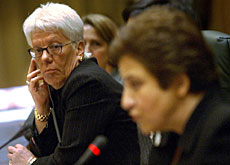
Two leading female lawyers, Switzerland’s Carla Del Ponte and the Iranian Nobel Prize winner, Shirin Ebadi, were in Geneva on Women’s Day to discuss equality before the law.
Speaking to swissinfo, Del Ponte, the chief prosecutor of the United Nations war crimes tribunal, said women still suffered injustice and obstacles to a career in law.
Del Ponte avoided reference to her prosecution of the former Yugoslav leader, Slobodan Milosevic, in her address on Monday, choosing to focus instead on whether women enjoy justice in the world’s courtrooms.
She was speaking at a conference organised by the International Labour Organization (ILO), which released a report concluding that although women were making inroads into the world’s legal systems, progress was slow and erratic.
Also addressing the conference was the 2003 Nobel Peace Prize winner, Shirin Ebadi, who added that women suffered severe discrimination in the judicial systems of Islamic countries.
“In Iran’s courts, the evidence of one man is worth that of two women,” said Ebadi, who was Iran’s first female judge but was forced to resign after the 1979 revolution.
“To protest the unequal situation of women in Iran, I’ve dressed in black today. I’m in mourning for women’s rights in Iran.”
Ebadi was later received by the Swiss foreign minister, Micheline Calmy-Rey in Bern, where she addressed the Swiss parliament.
For her part, Del Ponte said inequalities in law and justice were a violation of international legal principles.
swissinfo: Are women fairly and equally served by the global justice system?
Carla Del Ponte: I think so. Women now have better access to justice, especially as victims. And when it comes to the thousands of victims of crimes against humanity, war crimes and genocide, there really shouldn’t be a distinction between men and women. They should all be considered equally.
Professionally speaking, the efficiency of a judge, whether it’s a woman or a man, depends on his or her level of preparedness and knowledge of laws and the system… so there shouldn’t be a difference.
swissinfo: During your speech before the Women’s Day conference, you said that women tend to show particular courage in the courtroom. Why is that?
C.D.P.: Yes, this surprised me because I didn’t think there would be a difference when it came to court testimony. But I’ve noticed that women are much more courageous than men, especially in cases involving rape or sexual assault. It’s very difficult for a woman to decide to take the stand. But once she takes the decision, she no longer hesitates or sees obstacles to her defence. Cross-examination can be very aggressive and I see men who try to avoid answering the questions. But not women – women are fantastic, especially for a prosecutor of a rape case.
swissinfo: In your career, you’ve encountered terrorists, money launderers and war criminals. You’ve also said that your work has cost you two marriages. How has being a woman affected you, both personally and professionally, as a crime fighter?
C.D.P.: It is my contact with victims that motivates me not to lose the energy to pursue my goals. I represent the victims in court and I’m asking for justice for them. So contact with them, as a prosecutor, is very important because you see the suffering of these people and the hope they place in you to obtain justice.
A career in justice requires a certain level of motivation that, I believe, is the same for men and women. But it’s true that women are still handicapped by the fact that they are forced to make a choice. You can work in the justice system or you can take care of your family but it’s very difficult, if not impossible, to do both. We perceive this as an injustice… but at least we now have a choice.
swissinfo: How difficult is it to listen, day after day, to horrifying stories of war crimes? As a woman, does testimony of rape affect you more than it does male prosecutors?
C.D.P.: Yes, it does. Of course, it becomes easier as you gain more experience. As I get older, I think I can take more than the younger lawyers I see… but each time you get emotionally involved.
Women are the biggest victims of war in many ways. There are those who were raped and tortured before being killed and there are those who have outlived their husbands and sons… so their suffering continues.
They won’t find any peace until they’ve recovered the bodies or until they’ve received justice. And that’s why the International War Crimes Tribunal exists.
swissinfo: Is it easier for a woman to enter the legal system today than it was when you started out as an examining magistrate in the Swiss city of Lugano two decades ago?
C.D.P.: It’s much easier now but at that time, in 1980, we were in the south of Switzerland and being close to Italy, there was a macho culture to contend with. But that was many years ago. Now, it’s not really a difficulty for women.
I’ve been away from Switzerland for five years so it’s hard to say what the situation in Switzerland is like. But I remember from my time in Bern that a lot of my colleagues were women and I don’t think being a woman in Switzerland is an obstacle when it comes to reaching high-level positions.
swissinfo-interview: Anna Nelson and Frédéric Burnand in Geneva
The International Labour Organisation estimates that:
Women account for 40.5% of the world’s total workforce of 2.8 billion.
Women account for 60% of the world’s 550 million “working poor”.
In Europe’s former communist countries 91 women are economically active for every 100 men, but in the Middle East, North Africa and South Asia the figure is only 40.
Women’s share of professional jobs increased by just 0.7% between 2000 and 2002.

In compliance with the JTI standards
More: SWI swissinfo.ch certified by the Journalism Trust Initiative

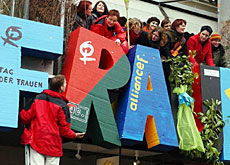
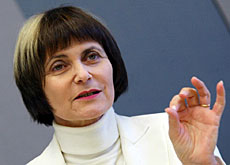
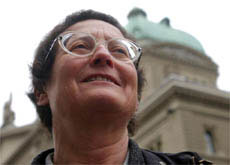
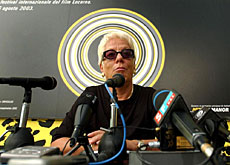
You can find an overview of ongoing debates with our journalists here. Please join us!
If you want to start a conversation about a topic raised in this article or want to report factual errors, email us at english@swissinfo.ch.